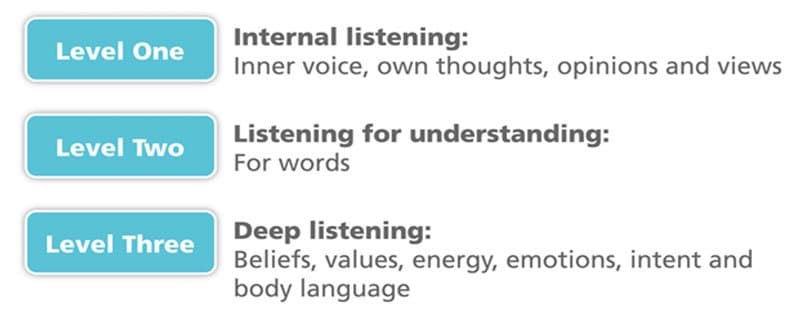Think about a time you felt misunderstood by somebody. Did you defend yourself? Correct them? Or simply disengage? Regardless of your response, you likely didn’t feel comfortable with them.
Now think of how it feels to be understood — you can relax, you want to open up, you feel more trusting. When you listen in a way that makes the other person feel heard, they are more likely to share information with you. And when you are actively listening, you are also more likely to take it in.
So what does it mean to actively listen?
Active and Empathetic Listening requires the presence and ability to pick up all the non-verbal as well as verbal communication from the person you are listening to. In our experience there are three levels of listening. Level One is self-listening where we are listening to our own internal responses to what is being said by the other person and not really hearing the truth of what they are actually saying.
Level Two is where we are listening to just the facts and data and filtering out most, if not all, of the non-verbal and/or emotional content that the other person is communicating.
Level Three is where as listener you are so present that you can hear and experience the full verbal and non-verbal communication of the other person. For us this is listening to understand as you hear beyond the words.

What are The Barriers to Active Listening?
There are many ways in which we sabotage our own ability to listen at Level Three. These are often referred to as ‘The Traps of Non-Listening’ and some of the most common traps include;
Advising: Giving counsel, advice, and solutions to problems
Probing: Asking questions from our own frame of reference or agenda
Interpreting: Explaining another’s motives and behavior based on our own experience
Evaluating: Judging and either agreeing or disagreeing
Hijacking: Interrupting the speaker and then telling our own similar story
Reloading: Instead of Actively Listening to the other person, we are formulating our response within our own minds as they are speaking
You can’t listen very well if you’re talking. In fact, if you rearrange the letters of the word “listen,” it spells “silent.
Some tips on how to actively listen at Level Three:
- Be Fully Present & actively listen as if this is the most important story you will hear today
- Turn down the volume on your inner dialogue and turn up the volume on your speaker’s story
- Acknowledge and reflect back what you’ve heard so that the speaker feels heard and understood
- Question if you’re unclear To use questions effectively, always attend and reflect before you ask a question.Understanding the other person and helping them feel understood provides a strong foundation. If you haven’t communicated that you heard someone, they may not be inclined to open up to your question
- Summarize the Key Messages at regular intervals in the conversation
- Remember that the only agenda a Level Three listener has is to understand the other person’s message
Offering somebody uninterrupted time to talk, even a few minutes, is a generous gift that we seldom give each other. It doesn’t mean you have to keep your mouth shut for hours and hours, but I encourage you to see how long you can simply listen to somebody without wanting to interrupt.
So to conclude Mark Twain said
“if we were meant to talk more than listen, we would have two mouths and one ear”
